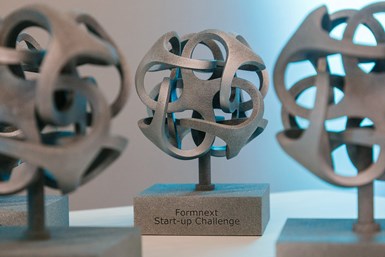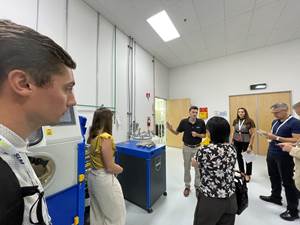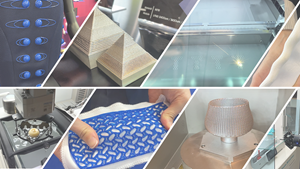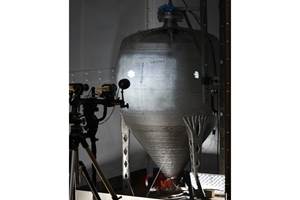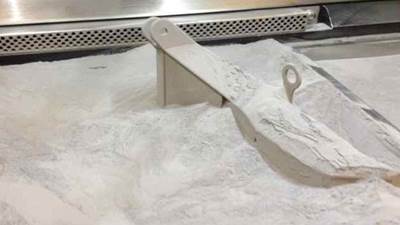Formnext Start-Up Challenge Announces 2023 Winners
Winners of the 2023 Formnext Start-up Challenge include titanium recycling, new 3D printing technologies and medical applications.
As part of its ninth international Start-up Challenge, Formnext has recognized up-and-coming enterprises from the world of additive manufacturing (AM) for their innovative business ideas and technical developments. The award-winning innovations showcase the broad applications of AM and range from medical applications to material recycling of titanium, analysis software and new 3D printing technologies targeting the automotive, electronics, dental and engineering industries, and more.
The Start-up Challenge recognizes viable new business ideas, and the judging panel consists of prominent representatives from the realms of industry, science, media and investment. The award is given to companies that are no more than five years old. The winners will exhibit their products at Formnext 2023, Nov. 7-11, 2023, in Frankfurt, Germany. Winners include Endless Industries (Germany), Helio Additive (USA), Odapt (Spain), Progresja New Materials (Poland) and Vitro3D (USA).
Thanks to the Start-up Challenge, the up-and-coming companies participating at Formnext will be given the opportunity to expand their network, exchange ideas with experts from the AM industry, and find potential partners or investors. They will also be offered a unique stage on which to present themselves and their innovations. All five award-winning startups demonstrate highly advanced technological solutions, and impress with the breadth of their technologies and potential applications. The fact that the winners hail from four different countries also reflects the international relevance of the Formnext Start-up Challenge.
Endless Industries and Vitro3D have developed existing 3D printing technologies (manufacturing of fiber-reinforced components and stereolithography), promising faster production speeds and higher component quality. With its Dragon slicing analysis software, Helio Additive also focuses on improving the printing process. Odapt has developed a customized baseplate for stoma patients, simplifying care while eliminating waste. Sustainability also plays an important role for Progresja New Materials — the Polish startup aims to recycle titanium and use it to produce powder for AM. The company also took home the AM Ventures Impact Award worth 5,000 euros, which was presented as part of the Formnext Start-up Challenge.
“The winners’ wide-ranging solutions demonstrate the AM industry’s huge potential for innovation and the versatility of the current and future applications of AM,” says Sascha F. Wenzler, vice president Formnext at trade fair organizer Mesago Messe Frankfurt. “They also show that this exciting technology can enable a wide range of innovative products and give us a powerful, practical tool for tackling current challenges such as climate change.”
The five winners will each receive a 3D printed award, as well as an exhibition and marketing package sponsored by Formnext and its partners. All the winners will showcase their innovations at their exhibition booths and present them at the Formnext Pitchnext event on the Industry Stage, Nov. 7, 2023, which will also be broadcast live on Formnext.TV.
Formnext Start-Up Challenge Winners
A New Approach to Printing With Carbon Fiber
With a new approach to the 3D printing of continuous carbon fiber, Berlin-based startup Endless Industries aims to shake up this fast-growing market. These extremely strong components are predominantly used in automotive manufacture, as well as in mechanical engineering and other industries. Endless Industries does not intend to launch its own printer on the market and is instead focusing on the material it has developed itself, its own software and a patented nozzle that processes carbon fibers and plastic simultaneously. With this solution, even large parts can be manufactured very effectively. As the startup does not produce its own 3D printers, it wants to collaborate with established manufacturers. Co-founder Stephan Körber says this will enable it to, “deliver the best solution for the customer.”
Thermal Simulation for Better Printing Results
Helio Additive, a startup founded in China in 2020 and now based in the U.S., will use its slicing analysis software to improve the 3D printing of plastics and composite materials. The company’s Dragon software is a thermal simulation of the additive manufacturing process — it slices 3D models into individual voxels and records their thermal progression. Helio Additive targets the fact that different plastics, such as PC and PA, expand to different degrees when exposed to heat, thus delivering different results in the printing process. The Dragon software is designed to use physical calculations to prevent printing errors and enable faster, more reliable printing that can be scaled effectively.
Customized Baseplate for Stoma Bags
Globally, 15 million people are unable to empty their bowels independently and therefore wear a stoma bag. This is attached to a base or skin protection plate, which is secured around the artificial opening. Spanish startup Odapt has a 3D-printed solution that can improve usage while significantly reducing waste. “Stool or urine leakage frequently occurs because the current pouches are not adapted to the different stoma shapes,” says the Barcelona-based company. Odapt has developed the first 3D printed silicone baseplate, which promises to prevent leaks. Thanks to 3D printing technology, the design can be adapted to any stoma shape and to any commercially available pouch.
EU-Wide Titanium Recycling Network
The Polish startup Progresja New Materials specializes in the Europewide recycling of titanium. This is because, while the EU is home to a large proportion of additive titanium powder processors, the raw material often comes from China or Russia. According to Progresja New Materials, there is an extremely low end-of-life titanium recycling rate in the EU, something which the company wants to change as quickly as possible. Scrap titanium will be collected from across the EU and will undergo various processes such as cleaning, thermochemical treatment, mechanical processing and atomization, resulting in a powder suitable for AM. The company is currently on the brink of launching large-scale production. To this end, a network of titanium recycling centers will be established throughout the EU at a later date, located near aerospace industry centers.
Fast Volumetric 3D Printing
U.S. startup Vitro3D has developed a volumetric AM technology that aims to impress with high speed and other features. Vitro3D processes a wide range of materials, including highly viscous resins, and can thus combine different material properties in one part. The cartridge-based printing technology also eliminates the need for support structures. The startup from Boulder, Colorado, plans to focus initially on the dental and electronics markets. It will enable the rapid, direct printing of aligners and enable electronics manufacturers to offer more complex PCBs without the need for new tooling.
- Learn more about Formnext 2023 as organizers partner with nordic region partners. The Nordic contingent will be based at the Nordic pavilion, where a special showcase of exhibits of successful AM applications is planned. Companies from the partner region will be presenting inspiring AM use cases, and the Danish AM Hub will be hosting a panel on sustainability.
Related Content
The AM Ecosystem, User Journeys and More from Formnext Forum Austin: AM Radio #43
Sessions and conversations at the first U.S. Formnext event highlighted the complete additive manufacturing ecosystem, sustainability, the importance of customer education, AM user journeys and much more.
Read MoreCopper, New Metal Printing Processes, Upgrades Based on Software and More from Formnext 2023: AM Radio #46
Formnext 2023 showed that additive manufacturing may be maturing, but it is certainly not stagnant. In this episode, we dive into observations around technology enhancements, new processes and materials, robots, sustainability and more trends from the show.
Read More10 Video Reports From Formnext 2023
Our Formnext video playlist: Stephanie Hendrixson and Peter Zelinski report on various technologies seen at Formnext 2023 in brief videos they filmed at the show.
Read MoreFinland’s Largest Metal 3D Print Withstands Pressure Vessel Test, Vastly Exceeding Expectations
The pressure vessel was created in cooperation between Andritz Savonlinna Works and the Finish Additive Manufacturing Ecosystem (FAME), and withstood the nondestructive and destructive tests carried out by LUT University.
Read MoreRead Next
Postprocessing Steps and Costs for Metal 3D Printing
When your metal part is done 3D printing, you just pull it out of the machine and start using it, right? Not exactly.
Read MoreAlquist 3D Looks Toward a Carbon-Sequestering Future with 3D Printed Infrastructure
The Colorado startup aims to reduce the carbon footprint of new buildings, homes and city infrastructure with robotic 3D printing and a specialized geopolymer material.
Read MoreCrushable Lattices: The Lightweight Structures That Will Protect an Interplanetary Payload
NASA uses laser powder bed fusion plus chemical etching to create the lattice forms engineered to keep Mars rocks safe during a crash landing on Earth.
Read More




